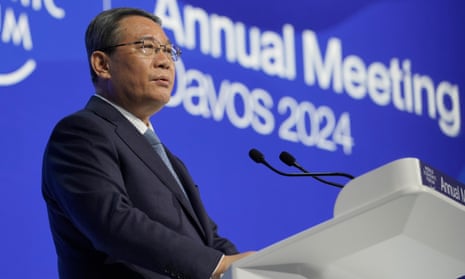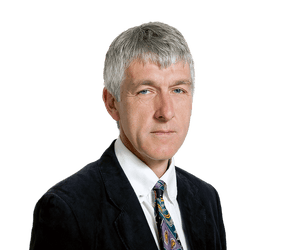Davos day one: von der Leyen warns against slackening support for Ukraine; Theresa May and Princess Eugenie’s modern slavery warning – business live | Business
Key events
Von der Leyen warns West against slowing support for Ukraine
Back in the Congress Hall here, Ursula von der Leyen warned the West not to stop supplying Ukraine with weapons and money if it wants Kyiv to succeed in its war against Russia.
Von der Leyen – who took part in Ukraine’s meeting with business chiefs this morning – told delegates:
“Ukraine can prevail in this war but we must continue to empower their resistance.
“Ukrainians need predictable financing throughout 2024 and beyond. They need a sufficient and sustained supply of weapons to defend Ukraine and regain its rightful territory.”
Theresa May and Princess Eugenie warn of modern slavery dangers
John Collingridge

Governments are failing to properly tackle the scourge of slavery and human trafficking even as it increases, former UK prime minister Theresa May has warned, here in Davos on the sidelines of the World Economic Forum.
Climate change, wars and the Covid-19 pandemic have contributed to the problem, she said.
“We’ve seen in recent years the number people in slavery increasing around the world.
“Conflict, the pandemic, the impact of climate change increase vulnerability to it.
At the same time governments are taking their attention off it.”
May, who heads the Global Commission on Modern Slavery and Human Trafficking, was speaking at an event on modern slavery at Davos alongside Princess Eugenie, who co-founded The Anti-Slavery Collective in 2017.
“Guns and drugs can be only trafficked once but human beings are trafficked again and again and again,” said Eugenie.
“For them it happens every day and minute.”
May said companies “need to really pay attention to supply chains” and government need to set tighter laws.

Von der Leyen: Russia is failing in Ukraine war
On Ukraine, Ursule von der Leyen says Russia is failing on its strategic goals.
Moscow has lost half of its military capabilities, and been driven out of half the territory it captured.
Ukraine has pushed back Russia’s Black Sea fleet, and begun supplying grain to the world again, she says.
It has been an economic failure too; Western sanctions mean Russia is now dependent on China.
It has also been a diplomatic failure, with Finland joining NATO, and Ukraine closer than ever in its path to joining the European Union, von der Leyen says.
But Ukraine needs more help – financing in 2024 and beyond, weapons supplies for the war, and to deter future action by Russia.
Next up, European Commission president Ursula von der Leyen.
She starts by reminding Davos delegates that last week’s WEF global risks report showed that misinformation and disinformation are biggest short-term risks.
These risks are limiting leaders’ ability to tackle the big global challenges we are facing, von der Leyen warns.
She says that Europe can and must take the lead in shaping the global response to falling trust, and that the private sector had a crucial role to play.
This will be a crucial year for trust in information, she adds, as democracies across the world head to the polls, in elections that will affect half the global population.
Li: China believes AI must do good for humanity

Onto questions
Q: what role will China play in artificial intelligence?
Li says artificial intelligence is a catchphrase, and that people love generative AI such as ChatGPT – but there is also suprise and some fear in some quarters about what it can do.
This technology seems omnipitant, he says, but people are taking time to get used to it.
He then describes AI as a double-edged sword.
If applied well, it can do good and improve human civilisation, and give great impetus to the scientific revolution.
But it also poses risks to security and to our ethics.
He tells delegates:
China believes that technology must serve the common good of humanity.
It must do good, and the same applies to artificial intelligence.
Li then explains that AI must be people-centred. People must control the machines, rather than the machines controlling us.
Thus, policymakers must facilitate good AI with appropriate governance.
Second, AI must be inclusive and beneficial for all, not just a small group of people.
Therefore, it is essential that countries work together and coordinate together, so they can share benefits together.
He adds that the interest of developing countries should be prioritised, to close the technology gap with other countries.
Premier Li then pledges that China will open its door still wider to the world.
He tells business chiefs in the audience here that choosing to invest in the Chinese market is not a risk, but actually an opportunity.
He says China is working on policies to address concerns about cross-border data flows, and will take active steps to address reasonable concerns of the global business community.
Li tells Davos that China’s demographic dividend is turning into talent dividend, and teh country will implement new technologies (such as the blockchain, and cloud computing) at a faster pace.
Delivering modernisation to 1.4 billion people will be a remarkable achievement in human history, he points out, pledging that China will play a key role in boosting aggregate global demand.
The world economic recovery requires strong underpinnings, Li points out.
And on the challenge of assessing China’s economy, he compares it to viewing the Alps – you need to step back and view it from a distance, to get the full picture.
Li says the Chinese economy is making steady progress, and will continue to provide a strong impetus for the world economy.
Over the years, China’s contribution to world economic growth has remained at around 30%. The economy rebounded last year and moved upward, with estimated growth of 5.2%, he adds.
Pointedly, Li adds that China didnt resort to massive stimulus, and focused on promoting development.
Li: China’s five-point plan to rebuild trust
China’s premier Li Qiang tells Davos he has a five-point plan to rebuild trust.
1) Strenthen macroeconomic policy coordination, to create better synergy and thus faster growth.
He warns that because economies are more linekd today, there are more spillover effects when. So if there are “fragmented responses” to crises, the world economy will become more fragile.
2) strengthen international industrial specialisation and cooperation, to keep supply chains “stable and smooth”.
He cites figures showing that 5,400 new discriminationary trade measures were introduced from 2020 to 2023, nearly doubling the number before the pandemic.
3:) enhance cooperation in innovation.
He says countries should work together for an open, just and non-discriminationary environment for science and technology, to let innovation thrive in an open environment
4) Strengthern cooperationon green development, to better tackle climate change.
He criticises the practice of erecting barriers to green trade, so some green technology cannot flow freely.
(Li may be thinking of the European Union’s push for restrictions on the import of green technologies from China)
Li argues countries must work together for a complete transiation to green economy
5) strenthen north-south and south-south cooperation, to build a more inclusive world economy.
He warns that issues such as the tech divide have become more acute in recent years.
True development is development for all, Li says, adding the the world must fully implement the UN’s 2030 agenda for sustainable development, and bridge development gaps.
Summing up, Li adds that the best way to earn trust is to be a better version of ourselves.
Li Qiang addresses Davos
Li Qiang, premier of the People’s Republic of China, is addressing Davos now,
Li is introduced by WEF founder Klaus Schwab, who says Li had an illustrious career in public service, rising up through the ranks to run three of China’s most economically vigorous regions.
Schwab adds that Li is seen as a pro-business and pro-reform leader.
Li then takes to the stage here in the Congress Hall.
Li says the theme of this year’s WEF meeting, “rebuilding trust”, will strike a chord with many people.
He explains that trust between countries allowed huge progress in globalisation over past decades.
But the foundation of trust has been eroded, which Li says is aggrevating risks to global growth and peaceful development.
He says it is essential to rebuild trust, whether to overcome current difficulties or to create a better future.
It is essential that we discard prejudice, and work together to tackle the trust deficit, Li insists.
He adds that the world has entered a new period of turbulence and transformation.
But, he insists, the overall dynamics of world progress moving forwards will not change.
Viola Amherd, President of the Swiss Confederation, is warning delegates here at Davos about the rise of fake news and misinformation.
She says Switzerland supports the global governance of artificial intelligence.
Those who rely on lies and misinformation may benefit in the short term, but in the long term they will lose trust, Amherd says.
She also reminds WEF attendees that some in the general public distrust all of us here.
Rebuilding trust is not just a job for states and politicians, she argues, it is a responsibility for the economy too.
Increased social inbalances fuel populism, Amherd points out.
And when the elite flaunt its wealth when ordinary familes can barely make ends meet, mistrust grows, she adds.
Qatar’s prime minister has told Davos that requiring Israel to agree to a time-bound, mandatory path to a two-state solution is key to achieving future stability in Israel and the Palestinian territories.
Speaking at the World Economic Forum today, Sheikh Mohammed Bin Abdulrahman al-Thani said the Palestinians must be the ones to decide if the Hamas movement that runs Gaza will continue to play a political role in the future, Reuters adds.
#Qatar: PM warns LNG flows to be affected by Red Sea escalation
— Giovanni Staunovo🛢 (@staunovo) January 16, 2024
Volodymyr Zelenskiy’s meeting with CEOs here at Davos has finished, and the Ukrainian president has been whisked away in a phalanx of security.
Leaving the meeting, Brian Moynihan, chief executive officer of Bank of America, tells us it was “terrific”, but declines to give more details.


Larry Elliott
We’ve had a quick chat with Harvard economics professor Ken Rogoff, one of the many experts here at the WEF Annual Meeting.
Rogoff doesn’t buy the soft landing idea that is prevalent in global financial markets, saying:
“I think that is the least likely scenario: we will either have a boom or a recession”.
Rogoff, who is a former IMF chief economist, said there was a risk that the attacks on shipping in the Red Sea were an example of the risks to the soft landing scenario.
He tells us:
“In the years since I completed my PhD in 1980 I can’t recall so much turbulence. Events are moving so quickly.”
The First Movers Coalition, a WEF initiative to encourage the decarbonization of the world’s heavy-emitting sectors, has picked up more members.
There are now 96 members, who’ve pledged to buy goods and services which only create very low emissions. The idea is to encourage development of breakthrough climate technologies by 2030, by showing there is commercial demand for them.
New members includel Qatar Airways, Velux, The Coca Cola Company, GE Vernova, DP World Limited, Capgemini, Danfoss A/S, Hanwha Ocean, Neutron Holdings (Lime), Volvo Cars, Inc., Chooose AS, Boom Technology, Drax Corporate Limited and Norsk Hydro ASA.
John Kerry, US Special Presidential Envoy for Climate, who’s here in Davos this week, says the Coalition is “driving critical progress” in the some of the hardest to address sectors.
Kerry explains:
“As members participate in offtake agreements and invest in decarbonization projects in support of their FMC commitments, they continue to give confidence to this market to develop faster.
This approach is pivotal in expanding the use and availability of the breakthrough technological solutions that will enable the deep decarbonization of heavy-emitting sectors.”

